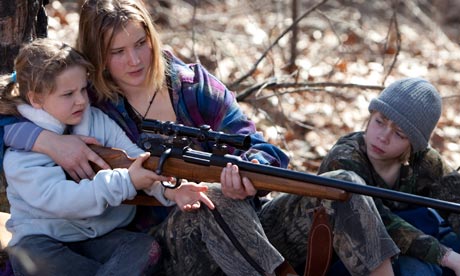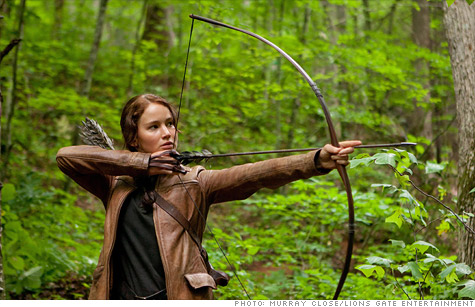Jennifer Lawrence makes this movie more worth watching than it already is. Her ability to make you forget that you're watching a movie is what does the trick. The unceasingly gray sky, cold wind, and cold-hearted people push you into the swell. The strident chasing of fate and "doing what a woman's got to do" is cumbersome to watch. But Lawrence as the catalyst of hopeful determination sees you through the hard times. At one point I thought I could smell bacon that she was cooking in my kitchen--I was looking forward to getting out of bed and having her walk me to school. Motherhood was forced on her, as it is a lot of young people in mountain culture. Most don't make it to the other side. I never doubted her for a second. She was pure in her fulfilling of Mel Gibson era drama and I appreciated how much she wanted to save the trees. She pursued the sense of place and home that so many in that part of the country really do. She did it with integrity and respect.
She is good at hunting squirrels and as is true with many American youth that have to hunt for their food, it's always in the back of her mind that if things get real tough then she can join the Army and be all she can be. In the first run of Winter's Bone the Army recruiter turns Jennifer Lawrence away because she is too young and not prepared to kill people. In the second run of the movie the producers released an alternate ending. She does not find her father in the alternate ending. In this alternate ending times are even tougher and the Army recruiter forces all of the young girls and boys to converge on Main Street. There he decides that he needs two young people to kill other less-well-to-do youth. If she kills all of the youth that the recruiters tell her to kill then she'll get a new house for her family.
This alternate ending is a little more gut wrenching. Lawrence's sister is drafted by the Army recruiter - he seemed so helpful in his disguise in the original ending but here he seems more selfish and cold. In this one, Lawrence appropriately takes the place of her drafted little sister. She will go to war as a volunteer. No sign up bonus, only her cunning spirit and survival instincts will help her. She's rushed away to a lavish city (LA, NYC? It's never stated outright, it's just the Capitol) to begin her training. All the contractors and former killers were there to watch and train a new batch of underprivileged youth from ghettos and Appalachia. This alternate ending is a full two hours of additional footage so hold on to your hats and settle in, this ending takes you for a ride to a land no less bleak than Missouri hill country. This ending takes you to the land of tax breaks for the wealthy, reality TV obsessed cultures, and an arena smaller in scale than Afghanistan and Iraq but no less depressed.
The producers made so much money off this second release and alternate ending that they renamed the movie. They called it The Hunger Games. Winter's Bone is a synonymous title but with so much of the focus in this second version on killing in the face of hunger the new name seems appropriate. At one point I thought this new ending was a little far fetched. I kept asking myself if it was just an allegory or parable for the present or if this was really happening? I guess I just didn't want to believe that our nation would really condone the killing of teenagers by other teenagers. I'm told there are a bunch of books on the subject. My friends were just telling me about a documentary called Restrepo that they just saw. My friends and I often watch war movies and documentaries. We get all caught up in the love stories, manifest destiny and come from behind montages that wrap around the killing. I suppose we're not the only ones that love watching and reading about teenagers killing other teenagers. But still, this is so far fetched. I mean, really? There are rich white men sitting around campaigning for the killing youth to be given Oakley sunglasses and survival gear? These Hunger games must make as much money for the rich guys as a real war makes for other rich guys.
Both movies are worth seeing. Jennifer Lawrence has secured her place in our future of movie watching. We'll see her many times in the next 40 years. The original, Winter's Bone is hard to watch at times because you hate to see a young girl take such a beating. It all seems too real and unnecessary. In the second version of Winter's Bone with the extended/alternate ending, renamed The Hunger Games, Lawrence still steals the show and takes quite a beating. You may think each is far fetched if you've had no personal experience with poverty and war--they must always be mentioned together--but as far as I know, both The Hunger Games and Winter's Bone are as accurate as can be. Now, what do we do with it all? Are we cool with Appalachian youth having to grow up so quickly? Are we cool with watching Appalachian youth kill other youth on our TV and movie screens? The box office receipts from The Hunger Games and our willingness to engage in conflict in other parts of the world seems to point to an answer. From the safety of our blogs and webcams it's easier to point in another direction. We'll see if movies are overt enough to dictate future pointing, I guess.
HOM:
Giving you something to read on the toilet since 2009.
"The mistake lies in seeing debate and discussion as secondary to the recovery of meaning. Rather, we should see them as primary: art and literature do not exist to be understood or appreciated, but to be discussed and argued over, to function as a focus for social dialogue. The discourse of literary or art criticism is not to recover meaning, but to create and contest it. Our primal scene should not be the solitary figure in the dark of the cinema but the group of friends arguing afterwards in the pub."
-Don Fowler (1996) "Even Better Than The Real Thing"
-Don Fowler (1996) "Even Better Than The Real Thing"



No comments:
Post a Comment